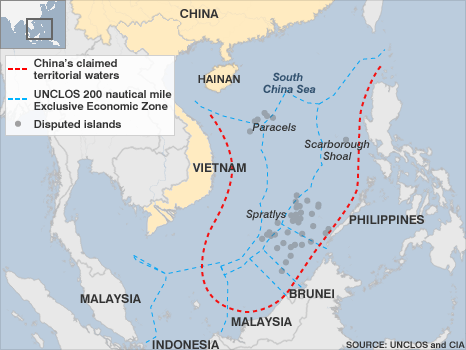At The Diplomat, James Holmes explains the odd fact that China is a “good citizen” in their coalition work with other countries fighting piracy away from home, but bullies its neighbours in the waters closer to home:
The analogy is the doctrine of “no peace beyond the line” practiced in late Renaissance Europe. To recap: in a nifty bit of collective doublethink, European rulers struck up a compact whereby nations could remain at peace in Europe, avoiding the hardships of direct conflict, while assailing each other mercilessly beyond a mythical boundary separating Europe from the Americas. In practice this meant they raided each other’s shipping and outposts in the greater Caribbean Sea and its Atlantic approaches.
It feels as though an inverse dynamic is at work in the Indo-Pacific theater. Naval powers cooperate westward of the line traced by the Malay Peninsula, Strait of Malacca, and Indonesian archipelago. Suspicions pockmarked by occasional confrontation predominate east of the South China Sea rim, a physical — rather than imaginary — line dividing over there from home ground.
A non-Renaissance European, Clausewitz, helps explain why seafaring powers can police the Gulf of Aden in harmony while feuding over the law of the sea in the East China Sea and South China Sea. It’s because the mission is apolitical. Counterpiracy is the overriding priority for the nations that have dispatched vessels to the waters off Somalia. Few if any of them have cross-cutting interests or motives that might disrupt the enterprise. It’s easy to work together when the partners bring little baggage to the venture.
[…]
You see where I’m going with this. The expedition to the Gulf of Aden is an easy case. It proves a trivial result, namely that rivals can collaborate for mutual gain when they have the same interests in an endeavor. Now plant yourself in East Asia and survey the strategic terrain within the perimeter separating the Indian from the Pacific Ocean. China views the South China Sea, to name one contested expanse, not as a commons but as offshore territory. Indeed, Beijing asserts “indisputable sovereignty” there.
Such pretensions grate on Southeast Asian states, while the United States hopes to rally coalitions and partnerships to oversee the commons. But if Beijing is serious about the near seas’ constituting “blue national soil” — and our Chinese friends are nothing if not sincere — then outsiders policing these waters must look like invaders. How else would you regard foreign constables or armies roaming your soil — even for praiseworthy reasons — without so much as a by-your-leave?




